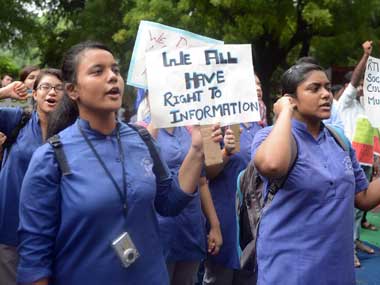It was on this day 11 years back that one of the most important laws in India fully came into force. The Right to Information Act, 2005 has helped expose some of the most infamous scams in the history of India. The RTI Act mandates timely response to a request for information from a public authority. [caption id=“attachment_3047292” align=“alignleft” width=“380”] Representational image. AFP[/caption] The history of the RTI Act goes back to the enactment of Freedom of Information Act, 2002, whose objective was to promote transparency and accountability. Because the government wanted the act to be made more effective, it was repealed and the Right to Information Bill, 2004 was passed by the Parliament in May, 2005. This received the president’s assent on 15 June, 2005. The RTI Act was notified in the Gazette of India on 21 June, 2005 and it became fully operational on 12 October the same year. Since then, the RTI Act has been used to fight corruption and has exposed deep-rooted graft in India. For example, the RTI applications filed by activists Yogacharya Anandji and Simpreet Singh in 2008 exposed the infamous Adarsh Housing society scam, which eventually led to the resignation of the then Maharashtra chief minister Ashok Chavan. That RTI application revealed that flats in the Adarsh Housing Society, a 31-storey building, which was originally meant to provide residence for war widows and veterans, were used to house politicians, bureaucrats and their relatives. In the 2G scam, in which the then Telecom Minister A Raja undercharged mobile phone companies for frequency allocation licenses and caused a loss of Rs 1.76 lakh crore to the Indian government, an RTI application by Subhash Chandra Agrawal revealed that Raja had a “15-minute-long” meeting with then solicitor-general Goolam E Vahanvati in December 2007 after which a “brief note was prepared and handed over to the minister”, but the minutes of the meeting were not recorded, stated this
report in The Huffington Post. The RTI Act was also used to expose corruption after the Commonwealth Games scam, in which the corrupt deals by politician Suresh Kalmadi embarrassed the nation. The report said that an RTI application filed by non-profit Housing and Land Rights Network showed that the then Delhi government had diverted Rs 744 crore from social welfare projects for Dalits to the Commonwealth Games from 2005-06 to 2010-11. In 2007, the RTI request filed by Krishak Mukti Sangram Samiti, an NGO, revealed irregularities in the distribution of food meant for people living below the poverty line by the public distribution system in Assam, according to a
report in The Wall Street Journal. In 2008, an RTI application by a Punjab-based NGO revealed that heads of the local branches of the Indian Red Cross Society had used money intended for the victims of the Kargil war and natural disasters to buy cars, air-conditioners and pay for hotel bills. A PTI report published in July 2016 said that an RTI query showed that only 12 members of the Maharashtra Cabinet have declared their assets and liabilities details as per Central governments code of conduct for ministers. Another one filed by social activist Anil Galgali showed that as many as 118 complaints of sexual harassment were filed at the Municipal Corporation of Greater Mumbai (MCGM) between 2013 and July this year. An RTI query filed by Child Rights and You (CRY) revealed in May this year that twenty-two children go missing in the national capital everyday with most of them being boys aged upto 12 years. Needless to say, the importance of the RTI Act can never be overstated. There are, however, some problems with the RTI Act, the most important one being that the huge number of RTI queries filed makes it difficult for public authorities to respond to them in a timely manner. A
2014 study conducted by the Commonwealth Human Rights Initiative (CHRI) revealed that over 1.75 crore RTI applications have been filed from 2005 to July 2014. According to this
report in The New Indian Express, there has also been a ten-fold increase in the number of RTI applications to the Prime Minister’s Office (PMO) between 2006-07 and 2014-15, said the CHRI study. The number of RTI applications per day to the PMO increased from 3 in 2006-07 to 35 in 2014-15. Add to this the fact that a lot of the RTI queries filed are frivolous and we have a real problem. For example, after the PMO website released a
list of RTI queries about PM Modi, it was revealed that one of the RTI queries was the following: “What is the speed of internet of Wi-Fi in the PMO?” Another one went like this: “Has the Principal Secretary to PM, Shri Nripendra Misra, ever taken his subordinates, in the Prime Minister’s office, on a picnic?” And if you thought you had seen the most ridiculous RTI queries, consider this one: “Enclose all the proper records and documents which show that the present Prime Minister of India, Shri Narendra Modi is The Prime Servant of India and not the Prime Minister.” The RTI Act is one of the most crucial tools that we have as citizens. We should not misuse this freedom for petty jokes. With inputs from agencies
The Right to Information Act, 2005 has helped expose some of the most infamous scams in the history of India. Here’s what 11 years of RTI Act gave us.
Advertisement
End of Article


)

)
)
)
)
)
)
)
)



